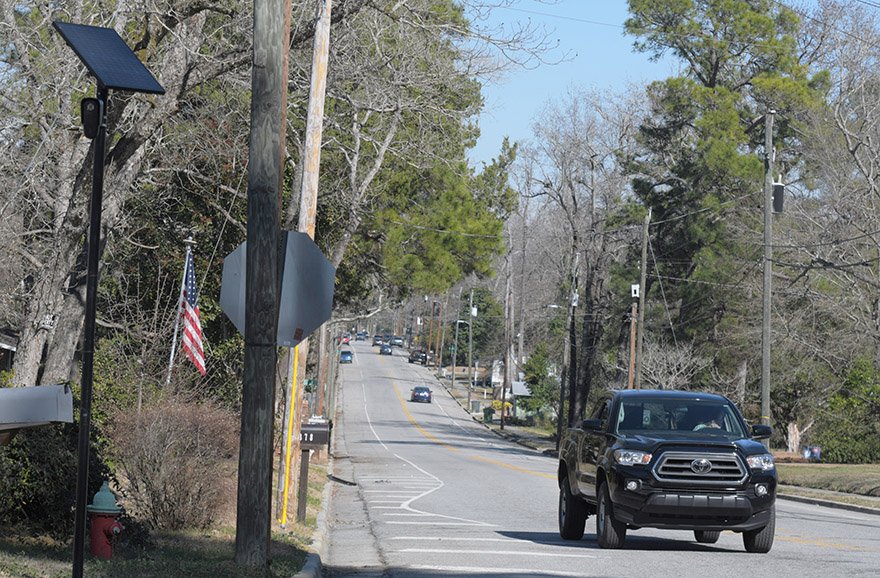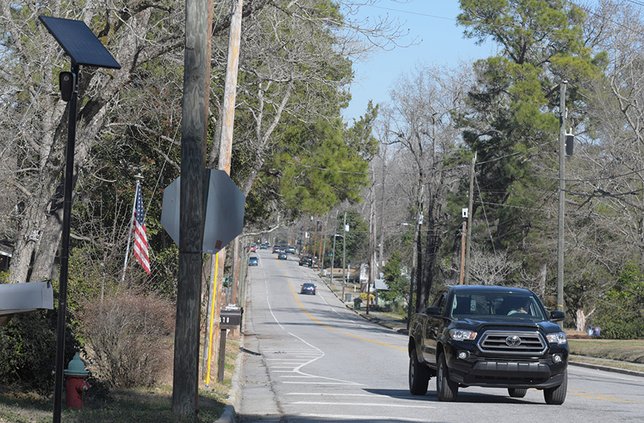Yes, the Statesboro Police Department now uses a system of cameras that read license plates digitally and capture images of vehicles. But no, they’re not the very obvious – and older – cameras that peer down at you from atop traffic lights at a few major intersections.
Those older “cameras,” as seen at the West Main Street-College Street and the Savannah Avenue-Zetterower Avenue intersections, simply detect the presence or absence of cars to trigger the traffic lights.
The newer, less in-your-face Flock brand license plate reader, or LPR, cameras are on short poles topped by small solar panels at locations across the city. So far there are 30 of the cameras in use, and ultimately there will be 36, leased from Flock Safety for three years and paid for entirely by a $565,942 Community Violence Reduction grant the city accepted from the Governor’s Office of Planning and Budget last June. The grant, ultimately federal money increased to the states under the American Rescue Plan Act, also covers a couple of other police technology items.
The Flock LPR cameras are programmed to read the license plate and snap a still picture of every vehicle that comes by, and that’s not their only capability, says Statesboro Chief of Police Mike Broadhead.
“We can enter a specific plate into the system, and if that car (say, a reported stolen vehicle) rolls past, the officers get notified in their patrol cars instantly,” he wrote in an email. “We have recovered several stolen cars, located wanted subjects, and even helped solve a homicide with the Flocks.”
13 crimes ‘solved’
After a subsequent phone interview, he supplied this tally of felonies and serious misdemeanors whose investigations have been “directly aided” by the Flock system so far: two homicides, one robbery, one home invasion, one aggravated stalking, one hit-and-run and seven vehicle thefts.
One of the homicides was the Aug. 20, 2023, killing of Jabari Walker, 17, shot multiple times at a residence on Ladd Circle. Police responded to reports of the shooting less than one hour after an incident in the Eagle Court Apartments area on Lanier Drive in which a man reported being robbed of his possessions by several young men who fled in a vehicle. In November, 17-year-olds Cameron Rock of Lanier Drive and Lucas Fields of Orleans Trail, along with a 16-year-old and a 15-year-old, all of Statesboro, were arrested on charges of felony murder and aggravated assault in connection with Walker’s death, plus robbery from the Eagle Court incident and charges related to the vehicle, reported stolen to the Sheriff’s Office.
The Flock system has also factored in the investigation of the Nov. 30 killing of Antawan Strickland 39, found on the driveway of a home on Johnson Street with multiple gunshot wounds in the mid-afternoon. A day later, Statesboro police took out arrest warrants for Anthony Jermail Johnson, 19, on charges of felony murder and aggravated assault in connection with Strickland’s death.
But Johnson, described as having black hair and brown eyes, 5’6” and 125 pounds, remains at large and wanted by law enforcement. The day the warrants were taken, SPD Capt. Jared Akins said it was “believed that the homicide was a witnessed event” but indicated that investigators were looking for any witnesses.
In that case, the only vehicle that triggered a Flock camera in the area around the time of the shooting turned out to provide a significant lead in the case, although police did find witnesses after the fact, Broadhead told the Statesboro Herald.
“I feel like in an era when people don’t really want to be cooperating witnesses to crimes, this is the technological leap that we need to be that kind of silent witness that provides us the information,” he said.
Started around campus
The Statesboro Police Department made its first exploratory step into Flock camera use in 2022, when Georgia Southern University put up several of the cameras around its Statesboro campus and the SPD installed four “to sort of fill in the blanks” around the campus system, Broadhead said.

Since the city of Statesboro and its Police Department obtained the Community Violence Reduction grant, the city and university have continued to coordinate the use of their growing Flock networks.
“We have access to the GSU cameras and they have access to our cameras, so it really is a nice way to integrate those systems together to provide as much security around the campus as we can,” Broadhead said.
But the system is now extended citywide with the city’s 36 grant-funded Flock cameras, he confirmed. The six remaining to be installed are awaiting Georgia Department of Transportation permits for locations on state right of ways.
With 30 cameras already installed, police are able to capture license plate numbers and other information on vehicles entering and leaving most Statesboro neighborhoods.
“It’s a still photo, and it doesn’t show the driver. It just shows the back of the car and the plate,” Broadhead said. “So it’s not as good, I guess, as having a picture of who’s driving the car at the time, but it does give you the make and model of the car and license plate. … It’s really good information.”
Incidentally, the images can also show cardboard or paper license plates or the lack of a license plate, and just as if they called in the plates themselves, police receive information on whether the plate matches the car for which it was issued.
If the department wanted to work traffic violations using the system, an officer could log into one Flock camera, park the patrol car and have the system run license plates for information on all the vehicles that go by, Broadhead acknowledges.
“You could do that. We don’t really have the resources to do that, but that is a function the system would allow,” he said.
‘Precision policing’
Instead, the SPD’s main purposes for the cameras, its chief said, are to obtain evidence of serious crimes and stop specific suspects in their vehicles. He said he knows some people have privacy concerns about camera systems but believes the license plate readers allow police to “just focus with some surgical precision on the people that are doing wrong.”
“This is something that we’re referring to as ‘precision policing’ in that rather than throwing out a dragnet and catching every fish in the sea, these kind tools allow us to just focus on criminals and leave everybody else alone to kind of come and go as they please,” Broadhead said.
Using the example of a hypothetical drive-by shooting, he said Flock cameras should allow police to go after the shooter’s car by make, model and tag number instead of stopping every white, four-door car in a two-mile radius.
The American Civil Liberties Union, in position statements posted on its website, aclu.org, has raised alarms that Flock’s growing network will be used as an artificial intelligence-driven national surveillance system. But the ACLU also states that it does not oppose the use of localized camera systems for legitimate law enforcement purposes.
Also in the grant …
With the current lease price of $127,500 a year, Statesboro’s use of Flock cameras will cost $382,500 over the three years. That left $183,442 for other purchases, including additional processor cores for the city’s existing Fusus video monitoring system and a gunshot detection system.
The gunshot detection system, also from Flock, uses acoustic sensors to detect the sound of gunshots and triangulate the location where the shots were fired. So far, it has produced less useful results than the cameras, Broadhead said, while also noting it has only been in operation since last fall.
But the Fusus network, expanding under a city contract with the Fusus company since early 2021 for real-time monitoring and recording of video mainly from private cameras around Statesboro, has produced evidence for a number of cases. Monitored from the dispatch center shared by the police and fire departments, it now includes more than 40 participating locations, such as businesses, apartment complexes and churches, accessing more than 1,000 cameras.
“And we’d like to get a whole lot more,” Broadhead said.

